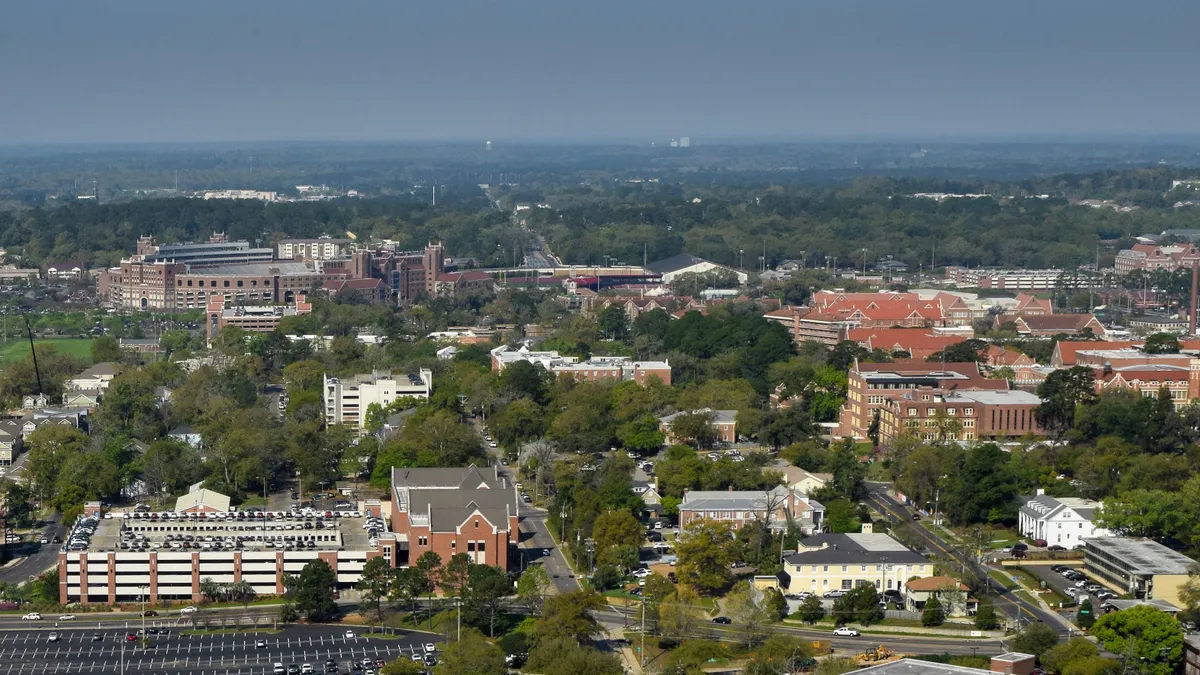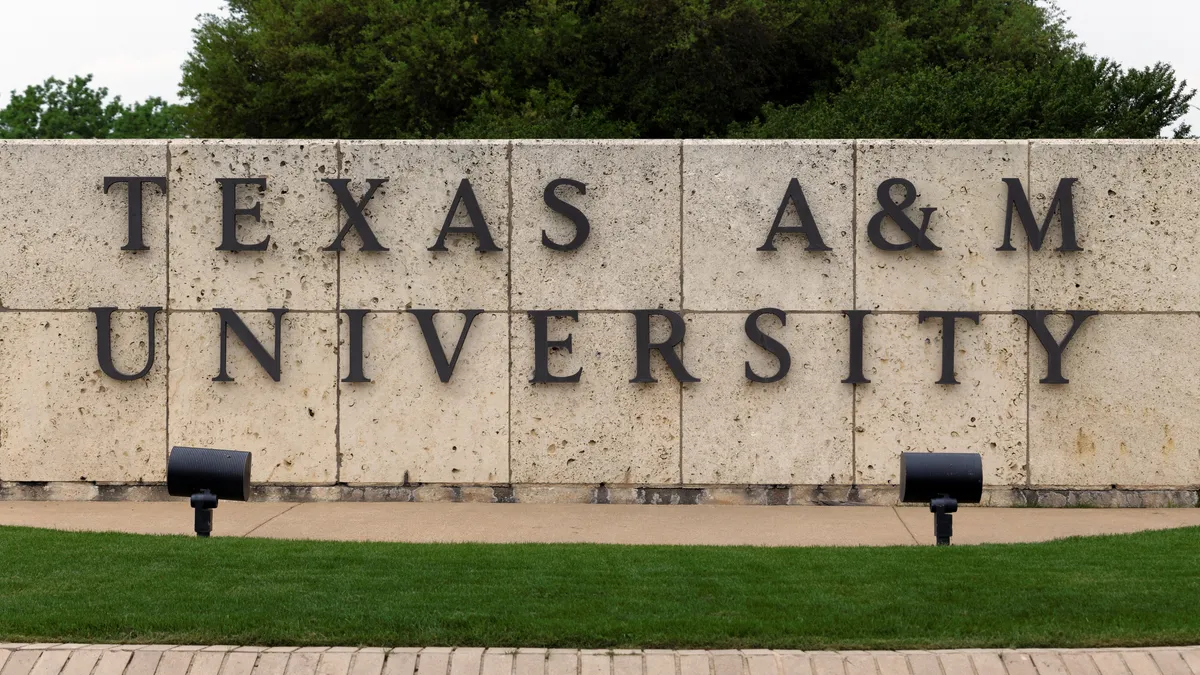Pressed to respond to students' concerns about the rising cost of higher education and their sometimes-foggy understanding of how their learning translates into jobs, some colleges are reshaping the degree pathway.
Their motivation for doing so is not only internal. Nontraditional education providers are proving to be stiff competition. Bootcamps prepare information technology and web-development workers in months, not years. And multinational firms now produce their own certificates that promise to be gateways to meaningful entry-level work.
"While colleges don't need to become vocational programs, they will need to find new ways to meet the needs of students and the economy or they risk losing out on that huge future market for lifelong learning," David Soo, chief of staff at Jobs for the Future, a nonprofit that advocates for better links between education and the workforce, told Education Dive in an email. It partnered with Google to offer its IT certificate at 100 community colleges.
Colleges are approaching this challenge in a variety of ways. Some are strengthening transfer pathways between two- and four-year schools, while others are bringing industry-recognized credentials into the curriculum sooner than they have in the past. In some cases, they are putting more weight on training experiences.
The University System of Georgia, for example, is creating a new type of two-year degree that requires students to take internships and upper-division courses — demands typically not found in associate degrees. Georgia is calling these "nexus" degrees.
"It's really a unique opportunity for Georgians to be able to have sort of a crucial training that takes them straight into the entry-level position in a high-needs field," said Tristan Denley, chief academic officer at the University System of Georgia, in an interview with Education Dive. He called it a "much more nimble kind of credential."
So far, two nexus degree programs are live, both at Columbus State University. Each prepares students for industries that have a major footprint in the state. One covers cybersecurity in financial technology and is meant to satisfy demand from companies in the region that together process 70% of the nation's payment card transactions.
The other, in film production, intends to feed a local economy that is a top destination for shooting movies.
Because the degrees require 12 units of upper-division courses and at least six through an internship, most of the 60 units needed to earn one come from general education. That can clear the way for a student pursuing a bachelor's, who must take general education courses anyway, to take an extra 18 credits to earn a certificate. That's roughly the equivalent of a semester and a summer course.
The perk applies to graduates as well. Denley said they can return and take only the 18 units of advanced courses and work experience. "That's a way to get promoted or continue with their career," he said.
He foresees other states offering nexus-inspired degrees. Although creating them requires approval from the institutions' accreditor, the process should be faster going forward. "This is no longer an abstract. This is a reality," Denley said.
Doubling up
The nexus degree may be new, but the concept of allowing students who are pursuing a bachelor's to earn a short-term credential at the same time is not.
Colorado Mesa University, a public four-year institution in Grand Junction, Colorado, is home to Western Colorado Community College (WCCC). It's a rare pairing that gives students at both schools access to short-term credentials and transfer pathways to bachelor's degrees.
For instance, courses taken at the community college level will be accepted at the four-year level if they are in the same discipline.
That level of guaranteed transfer of course credit is unusual in higher education. The explanation is simple: "We are them, and they are us," said Brigitte Sundermann, acting vice president of community college affairs at Mesa who oversees WCCC. To reach students even earlier, the community college hosts summer camps for middle- and high-school students. Last year 150 high school students earned technical certificates through dual enrollment programs at the college, Sundermann said.
Nationally, more than a fifth of the credits community college students earn are rejected by the public universities they transfer into, according to a 2017 report from the Government Accountability Office.
Not all short-term certificates at WCCC transfer seamlessly into majors at Mesa. A student with a welding certificate wanting to earn a bachelor's in engineering would need to take a few more engineering courses, because not all technical welding courses count as engineering courses, explained Kurt Haas, vice president for academic affairs at Colorado Mesa University.
However, a new interdisciplinary bachelor's option could guide the same student to take business classes as well, earning them a hybrid business-welding degree without losing any welding credit.
Mesa's being home to a community college also benefits students seeking a bachelor's who want to secure a shorter-term certificate instead of, or alongside, their four-year degree.
Certificates first
At BYU-Pathway Worldwide, part of a network of institutions that includes Brigham Young University in Provo, Utah, students are required to earn short-term certificates en route to an associate or bachelor's degree.
The model increases the likelihood that students who don't make it all the way to a bachelor's can at least show employers a certificate.
"We're not anti-general education, we're just re-sequencing it," Clark Gilbert, the institution's president, told Education Dive. "At BYU-Pathway, the first thing you do is earn a job-skill certificate. And then once you have a job skill and are employable, we layer on the other parts of your education."
It can also keep students engaged. Especially for low-income or first-generation students, "spending two years in general education seems both complicated and less relevant to future earnings," he said. About 70% of the university's domestic students are eligible for federal Pell Grants.
The online university enrolled around 45,000 students in 2019 through a combination of postsecondary and college-readiness programs. It offers more than 30 short-term certificates designed to give students a leg up in the job market. Each 15-unit certificate can be mixed and matched with others to form degrees. For example, two certificates and general education courses yield an associate degree; a third certificate earns a student one of the five bachelor's that BYU-Pathway offers.
Students can earn a certificate, work for some time, then return to continue their education. Retention semester-to-semester jumps from 66% to 85% once students complete their first certificate.
"While colleges don't need to become vocational programs, they will need to find new ways to meet the needs of students and the economy or they risk losing out on that huge future market for lifelong learning."

David Soo
Chief of staff, Jobs for the Future
Not all schools can easily emulate the certificate-first model, however. "You can't just take a major and chop it up and say the first 15 credits in a major are a certificate," Gilbert said. Certificates must have labor-market value from the get-go.
Another approach to ensuring students graduate with job-ready skills is to supply them with the industry certifications that employers value. For this, Florida stands out as a model. It reimburses public colleges that cover the cost of certain industry credentials for their students, which can be in the hundreds of dollars.
Having both an industry certification and an academic credential "is a much more powerful statement of your abilities," said Michael Prebil, a policy analyst at think tank New America, who co-wrote a 2018 report about the national landscape for bundling those credentials.
In California, community college students can access discounts on some industry certifications through a dedicated marketplace on Xvoucher, a hub for industry certifications.
Some of the 115 colleges in the state's two-year system distinguish themselves with industry-granted designations. At Sierra College, near Sacramento, Shawn Monsen, a computer information systems instructor, spent a year working on an application to have the school's cybersecurity program recognized by federal security agencies.
The commitment paid off in November, when the school formally received its designation, benefiting the roughly 200 students enrolled in those programs. The point, he told Education Dive, "was to bring credibility and acceptance to our program and the students that have graduated from our program."



















